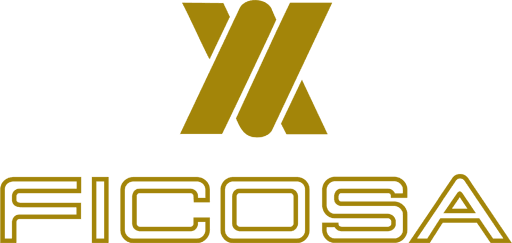
Our history has been marked by our clear innovative and international vocation. Since José María Pujol and José María Tarragó began this thrilling adventure in a small workshop in Barcelona in 1949, and throughout our more than six decades of history, we have held fast to our desire to connect with the future, which has allowed us to consolidate our position as a global benchmark in the motor industry.
1949 – 1985: The beginning
Our history began in 1949 when the company was set up to manufacture mechanical cables for the spare-parts market. With the revolution in the booming motor industry in Spain from the 1950s to the 1970s, Ficosa committed to technology in the sector and consolidated our position as a local automobile manufacturing supplier. Our internationalisation process began when the company set up shop in Oporto (Portugal) in the seventies.
1986 – 1995: Supplier to the top European manufacturers
Spain joining the European Economic Community in 1986 launched our leap into the European market at a time when we were already leaders in each of our product lines in Spain. Our high-quality products led us to supply the top European manufacturers.
1996 – 2000: A global company
In the 1990s, globalization became a challenge for us and we adapted to the new situation by boosting our operational efficiency and technological capacities. This was how we began our growth in North and South America; first in the United States and Mexico (1995), in Brazil and Argentina (1997) and in Asia (1998) through a joint venture with the Tata group.
2001 – 2009: Innovation and expansion
In 2001, we made an important qualitative and quantitative leap, consolidating our presence in Europe and setting up production centres in key countries such as Poland and Turkey. At this time, we also began operating in South Korea, Romania, China, and Russia. Plus, we gave our R&D activity a strong push by setting up a Technology Centre in Mollet del Vallés (Barcelona, Spain) in 2004. In 2006, we also opened an engineering centre in Monterrey (Mexico), reinforcing our technological capabilities in the NAFTA market.
2010-2014: Focusing on electronics and software
Our change of direction towards products with more electrical components accelerated with the acquisition of the Sony plant in Viladecavalls (Barcelona) at the end of 2011. We moved our Technology Centre to the plant, which has become the driving force for our organisation’s global research and development into Vision, Efficiency and Connectivity systems, giving us room to grow as we develop cutting-edge electronic and software products for the motor industry.
2015-2019: Technological growth
Our capital and business alliance with Panasonic, which began on 30 June 2015, acted as a catalyst for our growth in the new-technology market and enabled us to lead the transformation of the autonomous electric vehicle industry. Global industrial development during this period led us to expand the Dąbrowa Górnicza plant in Poland and open three new plants in Cookville in the US, Taicang in China and Rabat in Morocco.
We reached several milestones, such as producing 6 million parking cameras in just a few years, and in 2018, Ficosa led a pioneering technological shift from traditional rear-view mirrors to digital rear-view mirrors by producing the first CMS (Camera Monitoring System) on the market to be integrated into a vehicle produced in Europe.
And in the eMobility market, we launched our Battery Management System and On Board Charger, positioning Ficosa as a technical supplier for the control and management of electric and hybrid vehicle batteries. As part of our commitment to the future, in 2018, we opened our new e-Mobility facilities at the Viladecavalls plant in Barcelona, which has 4,000 kW of power and 4 laboratories.
Ficosa India Engineering Centre (FIEC) is founded in 2018 as Ficosa’s technology hub in India, a software engineering centre to leverage the expertise and experience offered by new technologies available in India. Since its foundation, the centre has grown exponentially, both in terms of staff and knowledge.
2020-2024: Sustainable development
The COVID pandemic of 2020 and subsequent supply crisis disrupted many growth and investment plans. Thanks to Ficosa’s human capital, the projects, although delayed, went ahead and allowed the company’s commitment to vision and mechatronic products and systems to be developed and produced, such as the parking assistance systems with 360-degree surround-view cameras.
Following Ficosa’s success with the CMS digital external rear-view system, the second generation is developed and production begins, which shows the technological capacity achieved by Ficosa.
Another ADAS system that began to shape the technological product portfolio was the in-vehicle detection systems that detect the presence of children inside the passenger compartment of the car.
In another growth vector that Ficosa is committed to, electromobility, new battery management and charging device projects were achieved, such as the Junction Box and iBMU connector panels for new electric vehicle manufacturers, achieving a significant diversification of customers.
In 2024 we further strengthened our manufacturing presence in North America by opening a third plant in Mexico (Monterrey).
In Ficosa, the social vocation of improvement and innovation in products and services has a direct impact on the commitment to corporate social responsibility, transcending in the reduction of accidents, connectivity, energy efficiency, less pollution, assistance and driver comfort.
In 2024 Ficosa celebrates its 75th anniversary and realises its corporate purpose: ‘Transforming Mobility to Improve People’s Lives’, extending this commitment to employees, customers and the communities we serve. With this purpose driving us, we are determined to create positive change in the world.








